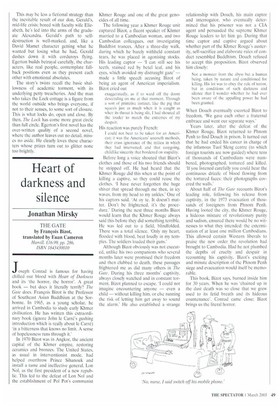Heart of darkness and silence
Jonathan Mirsky
THE GATE by Francois Bizot, translated by Euan Cameron Harrill, £16.99, pp. 286, ISBN 1843430010
Joseph Conrad is famous for having chilled our blood with Heart of Darkness and its 'the horror, the horror'. A great book — but does it literally terrify? The Gate does. Francois Bizot is the Professor of Southeast Asian Buddhism at the Sorbonne. In 1965, as a young scholar, he arrived in Cambodia to study early Khmer civilisation. He has written this extraordinary book (ignore John le Carte's gushing introduction which is really about le Carre) .in a bitterness that knows no limit. A sense of hopelessness runs through it.'
In 1970 Bizot was in Angkor, the ancient capital of the Khmer empire, restoring ceramics and bronzes. The United States, as usual in interventionist mode, had helped overthrow Prince Sihanouk and install a tame and ineffective general, Lon Nal, as the first president of a new republic. This led to the defeat of Lon No] and the establishment of Pol Pot's communist Khmer Rouge and one of the great genocides of all time.
The following year a Khmer Rouge unit captured Bizot, a fluent speaker of Khmer married to a Cambodian woman, and two Cambodian colleagues, out investigating Buddhist trances. After a three-day walk, during which he barely withheld constant tears, he was placed in agonising stocks. His leading captor — 'I can still see his teeth, stained red by betel leaf, and his eyes, which avoided my distraught gaze' — made a little speech accusing Bizot of being an agent of American imperialism. Bizot cried out
exaggeratedly, as if to ward off the doom descending on me at that moment. Through a sort of primitive instinct, like the pig that squeals just as much when it is caught as when its throat is being slit, I had shouted all the louder to match the extremes of my despair.
His reaction was purely French:
I could not bear to he taken for an Ameri can; it was the Americans' uncouth methods, their crass ignorance of the milieu in which they had intervened; and that easygoine, childlike sincerity that bordered on stupidity.
Before long a voice shouted that Bizot's clothes and those of his two friends should be stripped off. He had heard that the Khmer Rouge did this when at the point of killing a captive, so they could reuse the clothes. 'I have never forgotten the huge shiver that spread through me then, in icy waves, from my head to my ankles.' One of his captors said, 'At oy te. It doesn't matter. Don't be frightened, it's the procedure.' During the next three months Bizot would learn that the Khmer Rouge always said this before they did something terrible. He was led out to a field, blindfolded. There was a total silence. 'Only my heart, flooded with blood, beat loudly in my temples. The soldiers loaded their guns.'
Although Bizot obviously was not executed, unlike his two companions who several months later were promised their freedom and then clubbed to death, these passages frightened me as did many others in The Gate. During his three months' captivity, always closely watched and in constant torment, Bizot planned to escape. I could not imagine encountering anyone — even a child — without killing him, or else running the risk of letting him get away to sound the alarm.' He also established a strange relationship with Douch, his main captor and interrogator, who eventually determined that his prisoner was not a CIA agent and persuaded the supreme Khmer Rouge leaders to let him go. During that time captor and captive argued about whether part of the Khmer Rouge's austerity, self-sacrifice and elaborate rules of conduct resembled Buddhism. Douch refused to accept this proposition. Bizot observed him closely:
Not a monster from the abyss but a human being, taken by nature and conditioned for killing. His lot was to obey the rule of terror. but in conditions of such darkness and silence that I wonder whether he had ever been aware of the appalling power he had been granted.
When Douch eventually escorted Bizot to freedom, We gave each other a fraternal embrace and went our separate ways.'
Years later, after the defeat of the Khmer Rouge, Bizot returned to Phnom Penh to find Douch in prison. It turned out that he had ended his career in charge of the infamous Tuol Sleng centre (to which foreign tourists are now guided) where tens of thousands of Cambodians were numbered, photographed, tortured and killed. 'If you listened carefully you could hear the continuous drizzle of blood flowing from the tortured faces: their photographs covered the walls.'
About half of The Gate recounts Bizot's leading role, following his release from captivity, in the 1973 evacuation of thousands of foreigners from Phnom Penh. Having looted the city. the Khmer Rouge, a hideous mixture of revolutionary purity and sadism, ensured there would be no witnesses to what they intended: the extermination of at least one million Cambodians. This allowed certain Western liberals to praise the new order the revolution had brought to Cambodia. Had he not plumbed the depths of cruelty and despair in recounting his captivity, Bizot's exciting and minute description of the Phnom Penh siege and evacuation would itself be memorable.
This book. Bizot says, burned inside him for 30 years. When he was 'chained up in the dust death was so close that we grew used to its fetid breath and its hideous countenance-. Conrad came close; Bizot brings us the literal horror.


















































































 Previous page
Previous page